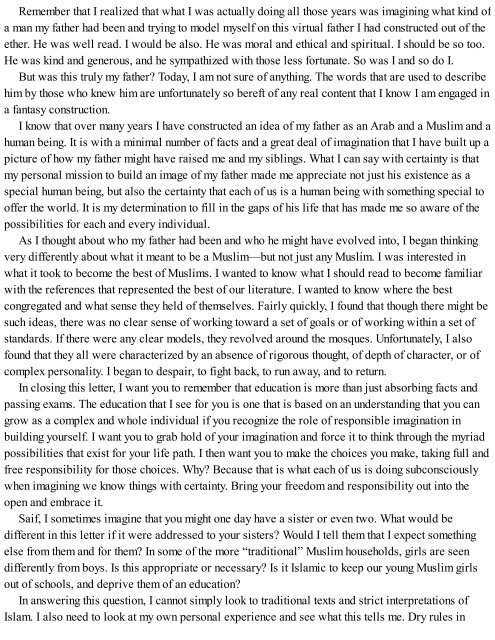1250119847
You also want an ePaper? Increase the reach of your titles
YUMPU automatically turns print PDFs into web optimized ePapers that Google loves.
Remember that I realized that what I was actually doing all those years was imagining what kind of<br />
a man my father had been and trying to model myself on this virtual father I had constructed out of the<br />
ether. He was well read. I would be also. He was moral and ethical and spiritual. I should be so too.<br />
He was kind and generous, and he sympathized with those less fortunate. So was I and so do I.<br />
But was this truly my father? Today, I am not sure of anything. The words that are used to describe<br />
him by those who knew him are unfortunately so bereft of any real content that I know I am engaged in<br />
a fantasy construction.<br />
I know that over many years I have constructed an idea of my father as an Arab and a Muslim and a<br />
human being. It is with a minimal number of facts and a great deal of imagination that I have built up a<br />
picture of how my father might have raised me and my siblings. What I can say with certainty is that<br />
my personal mission to build an image of my father made me appreciate not just his existence as a<br />
special human being, but also the certainty that each of us is a human being with something special to<br />
offer the world. It is my determination to fill in the gaps of his life that has made me so aware of the<br />
possibilities for each and every individual.<br />
As I thought about who my father had been and who he might have evolved into, I began thinking<br />
very differently about what it meant to be a Muslim—but not just any Muslim. I was interested in<br />
what it took to become the best of Muslims. I wanted to know what I should read to become familiar<br />
with the references that represented the best of our literature. I wanted to know where the best<br />
congregated and what sense they held of themselves. Fairly quickly, I found that though there might be<br />
such ideas, there was no clear sense of working toward a set of goals or of working within a set of<br />
standards. If there were any clear models, they revolved around the mosques. Unfortunately, I also<br />
found that they all were characterized by an absence of rigorous thought, of depth of character, or of<br />
complex personality. I began to despair, to fight back, to run away, and to return.<br />
In closing this letter, I want you to remember that education is more than just absorbing facts and<br />
passing exams. The education that I see for you is one that is based on an understanding that you can<br />
grow as a complex and whole individual if you recognize the role of responsible imagination in<br />
building yourself. I want you to grab hold of your imagination and force it to think through the myriad<br />
possibilities that exist for your life path. I then want you to make the choices you make, taking full and<br />
free responsibility for those choices. Why? Because that is what each of us is doing subconsciously<br />
when imagining we know things with certainty. Bring your freedom and responsibility out into the<br />
open and embrace it.<br />
Saif, I sometimes imagine that you might one day have a sister or even two. What would be<br />
different in this letter if it were addressed to your sisters? Would I tell them that I expect something<br />
else from them and for them? In some of the more “traditional” Muslim households, girls are seen<br />
differently from boys. Is this appropriate or necessary? Is it Islamic to keep our young Muslim girls<br />
out of schools, and deprive them of an education?<br />
In answering this question, I cannot simply look to traditional texts and strict interpretations of<br />
Islam. I also need to look at my own personal experience and see what this tells me. Dry rules in
















